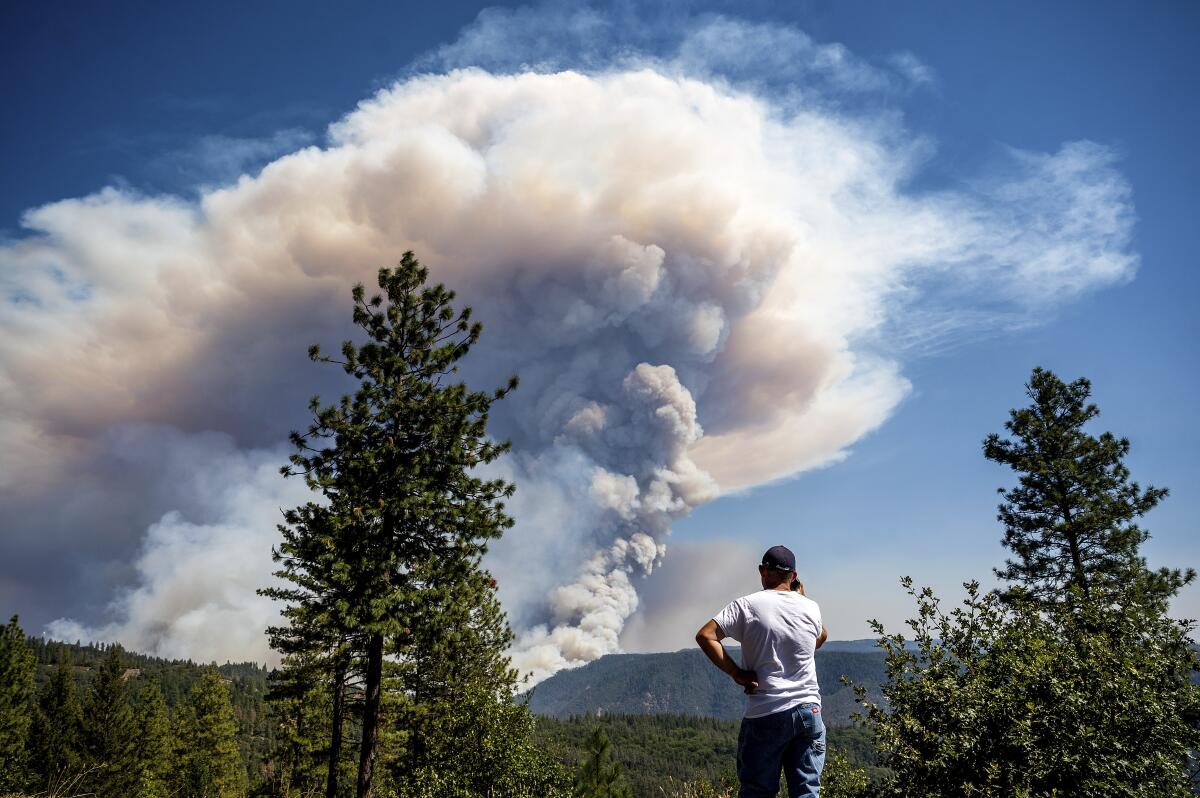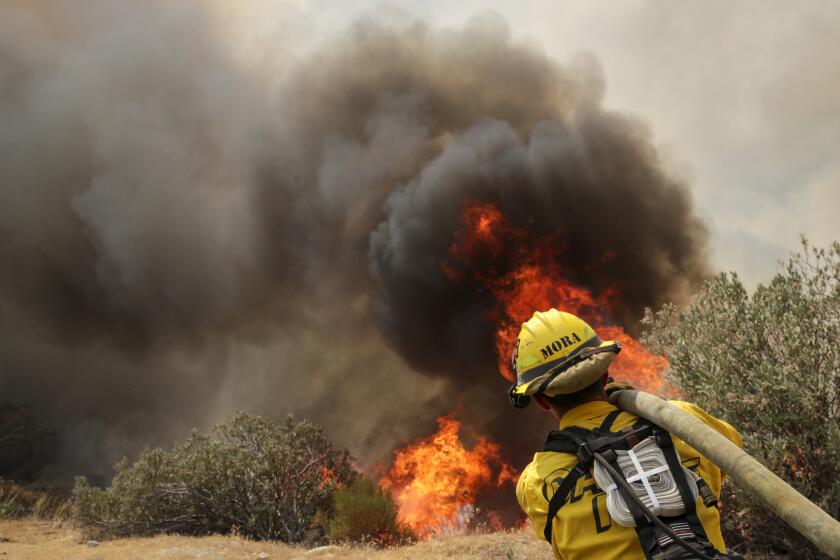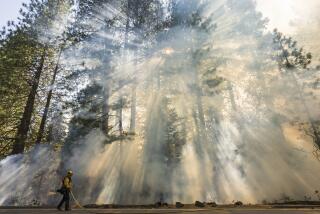Mosquito fire doubles in size west of Lake Tahoe, sending a pyrocumulus cloud skyward

SACRAMENTO — Fueled by critically dry brush and timber and boosted by record-setting heat, a fire in the foothills east of Sacramento doubled in size Thursday, sending smoke billowing east toward Lake Tahoe and western Nevada.
By the afternoon, the fire had wafted a giant pyrocumulus cloud over the Sierra, jumped the Middle Fork of the American River and was burning its way toward the hamlet of Volcanoville in El Dorado County.
Also Thursday, PG&E filed a report with the state disclosing “electrical activity” on one of its transmission lines near where the Mosquito fire ignited Tuesday evening, near Foresthill in Placer County. By 9:04 a.m. Friday, the blaze had grown to 14,250 acres with no containment, after doubling in size Thursday.
“It’s very hot. It’s dry, and it’s burning into areas where there are people,” said California Department of Forestry and Fire Protection public information officer Chris Vestal. “The No. 1 priority is to get people out of their homes and out of the area.”
The fact that the blaze was now chewing through dry timber on both sides of the river, he noted, “presents a new challenge” to fire conditions that were already dangerous.
Gov. Gavin Newsom declared a state of emergency Thursday for El Dorado and Placer counties due to the fire. The order also covers Riverside County, where the Fairview fire has grown to nearly 24,000 acres, claimed two lives and injured another person.
More than 1,000 structures are threatened by the Mosquito fire, and some homes had been destroyed, but officials said they did not yet know how many. A mandatory evacuation order for about 2,500 people was in effect in parts of Placer County. Evacuation orders were expanded Thursday to include hundreds of people living in Volcanoville and nearby Georgetown and Bottle Hill.
An evacuation center to receive those displaced was set up at the Bell Road Baptist Church in Auburn. Another temporary evacuation center was set up at the Cool Community Church in Cool.
The fire was also threatening the Ralston hydroelectric powerhouse, the Sugar Pine Dam and other pieces of critical infrastructure.
Vestal, the public information officer, said firefighters “know how critical those resources are” and are working to protect them. Like much of California, the Sacramento region has been baking under a historic heat wave, and hydropower is vital for keeping air conditioners running.
It was unclear how the fire started, but shortly after 10 a.m. Thursday, PG&E filed an incident report with the California Public Utilities Commission noting that “electrical activity occurred close in time to the report time of the fire” near one of its transmission lines.
The utility reported that the U.S. Forest Service had placed caution tape around the base of the pole involved in the incident, which was near the Oxbow Reservoir in Placer County.
In a statement, PG&E officials said that they have, thus far, “observed no damage or abnormal conditions to the pole or its facilities near the reservoir” and have not “observed any downed conductor in the area or any vegetation or tree on the line.” The pole was inspected within the last five months, the statement added, and no adverse conditions identified. The report to the PUC was made, the utility said, “out of an abundance of caution.”
PG&E officials added that they are supporting suppression efforts by de-energizing power lines for firefighter safety.
Tropical Storm Kay is forecast to bring winds topping 50 mph to the area of the 24,000-acre Fairview fire
For many in the foothills below Lake Tahoe, the Mosquito fire bore ominous similarities to last year’s Caldor fire, which started Aug. 14. It eventually grew to more than 200,000 acres, burning across the Sierra Nevada mountain range and threatening the city of South Lake Tahoe before its advance was finally stopped.
The Mosquito fire is making a run in similar terrain a bit farther to the northwest. Fire officials acknowledged the similarities, but Vestal noted: “There is a big difference. There are many fewer homes and fewer people” in the immediate area of this fire.
He noted that the next two days will create difficult conditions for firefighters, with triple-digit temperatures and wind gusts of up to 20-25 mph. But this weekend, temperatures are expected to drop significantly.
There is “great potential for this fire to spread,” Vestal said, “but of course, we hope it will stop sooner.”
Downwind of the fire, smoke created hazardous air quality conditions in the Sacramento foothills, but winds in the afternoon helped clear out some of the soot.
Times staff writer Gregory Yee contributed to this report.
More to Read
Sign up for Essential California
The most important California stories and recommendations in your inbox every morning.
You may occasionally receive promotional content from the Los Angeles Times.













